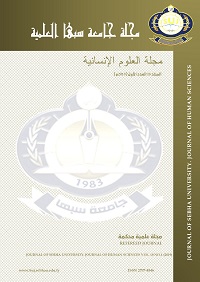Reasons for administrative negligence in the General Authority of the Social Solidarity Fund From the point of view of heads of departments and units of Sebha branch
DOI:
https://doi.org/10.51984/johs.v20i2.1680Keywords:
Negligence, Administrative, Employee, Solidarity, BossAbstract
This study aimed to identify the causes of administrative negligence in the General Authority of the Social Solidarity Fund. This is done by gathering the point of view of the heads of departments and units of Sebha branch. The sample size was (43) department heads and one unit head. The tool consisted of (30) expressions. The (T) test is used in the statistical analysis. The one-way variance test is also used. The two researchers relied on the descriptive-analytical approach. The results of the study ensured the following: There are statistically significant differences for the reasons for administrative negligence in the General Authority of the Social Solidarity Fund, from the point of view of the heads of departments and units in the General Authority. This is happening according to the degree of freedom and these differences are classified in favour of the sample members. There are no statistically significant differences to the reasons for administrative negligence in the General Authority of the Social Solidarity Fund, from the point of view of the heads of departments and units, due to the gender variable. There are no statistically significant differences to the causes of administrative negligence in the General Authority of the Social Solidarity Fund from the point of view of the heads of departments and units. This is due to the variable of social status. Statistically significant differences to the reasons for administrative negligence in the General Authority of the Social Solidarity Fund from the point of view of the heads of departments and units are due to the variable, years of service. These differences are in favour of the heads of the departments and units with experience of 25 years and above.
Downloads
Downloads
Published
Issue
Section
License
Journal of Humanities Policy on Intellectual Property and Plagiarism
1. Commitment to Intellectual Property and Ethics
The Journal of Humanities (JOHS) is fully committed to respecting intellectual property rights and aims to protect the originality and authentic work of authors who submit their manuscripts for publication. The journal takes a firm stand against articles that contain any form of plagiarism and emphasizes the need for all researchers to adhere to the highest ethical standards in scientific research.
2. Anti-Plagiarism Policy
The journal considers plagiarism a serious violation of academic ethics. Therefore, authors must ensure that their work is original and not plagiarized, and that any use of external sources is properly cited and documented according to correct academic standards.
-
Actions Taken: In the event that any plagiarism or academic theft is discovered in a submitted article, the editorial board will contact the author to request a formal explanation within a maximum period of two weeks from the date of notification.
-
Investigation and Decision: After receiving the explanation, the article will be referred to the journal's specialized committees, which will investigate the matter and take the necessary measures, which may include the permanent rejection of the article and the imposition of disciplinary actions.
3. Publication License and Author Rights
The journal adopts the Creative Commons license type Attribution-NonCommercial-NoDerivs 4.0 International (CC BY-NC-ND 4.0), which allows for the following:
-
Attribution: Users are entitled to cite the content published in the journal and use it in their work, provided that the original source and author are clearly credited.
-
Non-Commercial: The published content may not be used for any commercial purpose.
-
NoDerivs: It is not permitted to make any modifications, distortions, or to build derivative works from the published content.
Under this license, authors are required to complete an exclusive license agreement for the journal. Authors retain the rights to their research data and may reuse and share their work for scientific purposes with proper citation.







